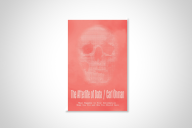You have /5 articles left.
Sign up for a free account or log in.
Cosmopolitan gadabout and photogenic meta-pundit Bernard-Henri Lévy has written a book about the pandemic, because of course he has. Internal evidence shows that The Virus in the Age of Madness was finished in June and Yale University Press published it the following month. The reviewer only getting around to reading it in mid-August feels positively dilatory.
BHL, as he is known in France, exemplifies the sort of “fast thinker” that the sociologist Pierre Bourdieu saw as the product of the intellectual world’s colonization by the mass media. I wrote about that here in 2008 and a couple of years later looked into an especially memorable incident in which Lévy was caught quoting a blatantly satirical book about Immanuel Kant as if it were a serious monograph.
Since then, BHL has published a good deal more (that is an understatement) through applying what might very loosely be called his quasi-Cartesian neo-historicist methodology. In sum: everything in the world reminds BHL of himself -- more specifically, of his own career, which, after several decades of lunches with the powerful and the erudite, by now constitutes an integral part of world history. His books have the feel not of monologues exactly, but of interviews with himself consisting of a disproportionate number of long rhetorical questions. BHL reminds the reader that he has grappled with certain issues in previous books and wonders if the public will now understand the importance of what was said there. He has also made some films. This tends to be mentioned.
Any urge to keep up to date with BHL’s work over the past decade has been quite resistible, but along came The Virus in the Age of Madness, and my curiosity got the better of me. Mercifully brief yet impressively long-winded, it is perfectly brand-standard BHL.
“All my life,” we are reminded, “I have fought against the trap of secular religiosity. Since my early days, when I wrote Barbarism with a Human Face and first read Lacan, I have maintained that assigning a sense or meaning to something that has none and putting words to the beyond-sense that is the inexpressible act of human suffering is one of the sources of psychosis at best, and totalitarianism at worst. And I have always thought that it does no one any good to reduce politics to the clinic, to classify as ‘disorders’ the parts of man that are death and evil, or to claim to be able to cure the human race of those conditions.”
Indeed, it does not. Death is here to stay, and evil only ever hides. And while the QAnon movement (already spreading, in a viral manner, well before the pandemic) seems not to have been on BHL’s radar while writing the book, it is manifestly an American strain of “secular religiosity” of the apocalyptic variety. Thus far, his points are valid, if a little floridly made.
But more particularly BHL’s thesis here amounts to a claim that the world's responses to the coronavirus have been a matter of political psychosis, verging on incipient totalitarianism: barbarism with a human face wearing personal protective equipment.
It seems that the public mind on all continents has been seduced by “a foolish conceit,” namely:
the idea that the virus is speaking to us, that it has a message to deliver, and that because nothing in this world happens without cause or intention, this particular virus, this coronavirus, this virus with spikes and a crown, this king of a virus, must be secretly invested, like a cunning ruse of Hegelian history, with a part of the spirit of the world and thus with a mission: to reorchestrate the fanfare of All against the Government; to function as an unsparing critic of failed globalization or, as Ivan Vejvoda said in The New York Times, to pose "questions about the interconnectedness of the world as we’ve built it." According to them, it was the virus that brought into view, as if from invisible ink, the disorders and injustices of the famous "world before" that people were now claiming to have been absolutely detestable. As if a virus could think, know or intend anything!
The transfiguration of a rogue strand of RNA into a conscious agent, storming the cockpit of the zeitgeist, does sound delusional. But BHL’s claim that the virus “drove us quite literally mad” cannot, on his evidence, be taken literally. He frets with rather theatrical vehemence over a variety of rather pedestrian efforts to muddle through a situation rife with the potential for terror.
Did people blog about enjoying domestic space and a slower pace of life because there wasn’t much alternative? “All of that,” BHL declares, “was the exact opposite of what is most honorable in man’s vocation. It flew in the face of Greek wisdom, which, from Aristotle on, held that man was a political animal.”
Did the menace of COVID take up an overwhelming majority of the news cycle particularly when the reports from Italy and Spain were worse than grim? That was “a collective panic, aggravated by news channels and social networks that, by reporting to us, day after day, the numbers of those who had died, were still in critical condition, or had recovered, herded us into a parallel universe in which nothing else, anywhere, was news -- and, in so doing, drove us quite literally mad. … How would we react if the traffic safety authorities decided to install giant loudspeakers at one-mile intervals to inform us of the day’s highway fatalities?”
I suppose we’d drive more carefully for a while and then tune them out, though that can’t have been his point. (The trouble with rhetorical questions is that someone might call your bluff.) “I went back over a week’s worth of news,” BHL declares. “No special week. Just one particular week, and it does not matter which one because it was an ordinary week. And I discovered that, according to the mirror that it held up to us, not a thing had happened that week except for the virus.” Not giving any dates here is a canny move, since otherwise someone might demand that he produce the all-COVID issue of Le Monde.
But to continue … Did some public figures remind us of earlier arguments that economic and ecological trends made viral catastrophe on a global scale just a matter of time? Here we find BHL starting to lose it a bit:
Oozing goodness and contrition, they sing, reminding us that even before the pandemic they warned against the folly of a world that could not continue as it was, a world headed straight into a wall. They fob off on us, disguised as good medicine, old finger-pointing claptrap that they hope this time will stick. With restrained (but cruel) gloating, they hail the revenge of the real, or the natural, over the arrogance of man and his sins. The deviousness of these flagellants, trying their damnedest, from their perch on the backs of the victims, to scold the survivors and overwhelm them with remonstrances!
It is necessary to quote so much since mere paraphrase would never convey the sheer histrionic fervor of BHL’s performance. It takes a special kind of daring to denounce everyone else’s self-righteousness and self-satisfaction in such tones of self-righteous self-satisfaction. Toward the end of the book BHL pronounces an anathema:
To the thaumaturgists who adored their beautiful virus as Dante did Beatrice and whose armchair catechism could not conceal how little importance they attached to real people and their pain, to the invasive chatterboxes whose positivistic religiosity drowned out the voices of the caregivers on too many days, I was dying to say, “Shut up! Please just shut up.”
Indeed.








